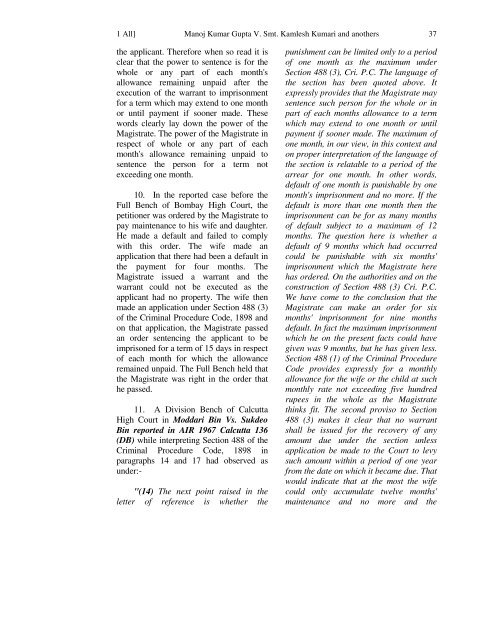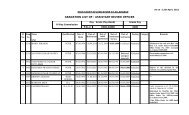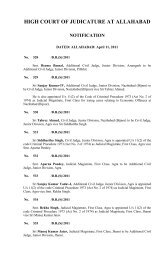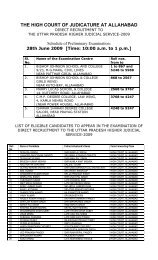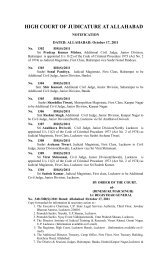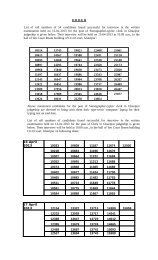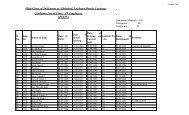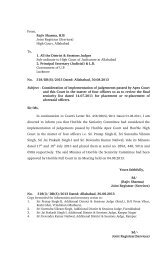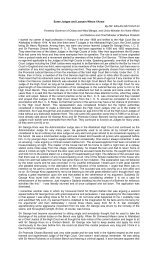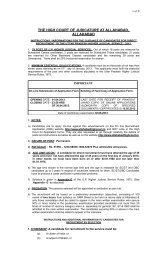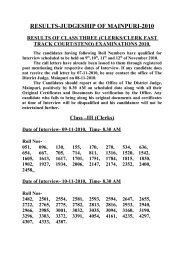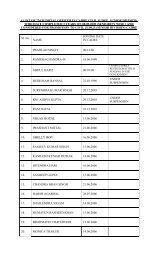Jan - High Court of Judicature at Allahabad
Jan - High Court of Judicature at Allahabad
Jan - High Court of Judicature at Allahabad
Create successful ePaper yourself
Turn your PDF publications into a flip-book with our unique Google optimized e-Paper software.
1 All] Manoj Kumar Gupta V. Smt. Kamlesh Kumari and anothers 37the applicant. Therefore when so read it isclear th<strong>at</strong> the power to sentence is for thewhole or any part <strong>of</strong> each month'sallowance remaining unpaid after theexecution <strong>of</strong> the warrant to imprisonmentfor a term which may extend to one monthor until payment if sooner made. Thesewords clearly lay down the power <strong>of</strong> theMagistr<strong>at</strong>e. The power <strong>of</strong> the Magistr<strong>at</strong>e inrespect <strong>of</strong> whole or any part <strong>of</strong> eachmonth's allowance remaining unpaid tosentence the person for a term notexceeding one month.10. In the reported case before theFull Bench <strong>of</strong> Bombay <strong>High</strong> <strong>Court</strong>, thepetitioner was ordered by the Magistr<strong>at</strong>e topay maintenance to his wife and daughter.He made a default and failed to complywith this order. The wife made anapplic<strong>at</strong>ion th<strong>at</strong> there had been a default inthe payment for four months. TheMagistr<strong>at</strong>e issued a warrant and thewarrant could not be executed as theapplicant had no property. The wife thenmade an applic<strong>at</strong>ion under Section 488 (3)<strong>of</strong> the Criminal Procedure Code, 1898 andon th<strong>at</strong> applic<strong>at</strong>ion, the Magistr<strong>at</strong>e passedan order sentencing the applicant to beimprisoned for a term <strong>of</strong> 15 days in respect<strong>of</strong> each month for which the allowanceremained unpaid. The Full Bench held th<strong>at</strong>the Magistr<strong>at</strong>e was right in the order th<strong>at</strong>he passed.11. A Division Bench <strong>of</strong> Calcutta<strong>High</strong> <strong>Court</strong> in Moddari Bin Vs. SukdeoBin reported in AIR 1967 Calcutta 136(DB) while interpreting Section 488 <strong>of</strong> theCriminal Procedure Code, 1898 inparagraphs 14 and 17 had observed asunder:-"(14) The next point raised in theletter <strong>of</strong> reference is whether thepunishment can be limited only to a period<strong>of</strong> one month as the maximum underSection 488 (3), Cri. P.C. The language <strong>of</strong>the section has been quoted above. Itexpressly provides th<strong>at</strong> the Magistr<strong>at</strong>e maysentence such person for the whole or inpart <strong>of</strong> each months allowance to a termwhich may extend to one month or untilpayment if sooner made. The maximum <strong>of</strong>one month, in our view, in this context andon proper interpret<strong>at</strong>ion <strong>of</strong> the language <strong>of</strong>the section is rel<strong>at</strong>able to a period <strong>of</strong> thearrear for one month. In other words,default <strong>of</strong> one month is punishable by onemonth's imprisonment and no more. If thedefault is more than one month then theimprisonment can be for as many months<strong>of</strong> default subject to a maximum <strong>of</strong> 12months. The question here is whether adefault <strong>of</strong> 9 months which had occurredcould be punishable with six months'imprisonment which the Magistr<strong>at</strong>e herehas ordered. On the authorities and on theconstruction <strong>of</strong> Section 488 (3) Cri. P.C.We have come to the conclusion th<strong>at</strong> theMagistr<strong>at</strong>e can make an order for sixmonths' imprisonment for nine monthsdefault. In fact the maximum imprisonmentwhich he on the present facts could havegiven was 9 months, but he has given less.Section 488 (1) <strong>of</strong> the Criminal ProcedureCode provides expressly for a monthlyallowance for the wife or the child <strong>at</strong> suchmonthly r<strong>at</strong>e not exceeding five hundredrupees in the whole as the Magistr<strong>at</strong>ethinks fit. The second proviso to Section488 (3) makes it clear th<strong>at</strong> no warrantshall be issued for the recovery <strong>of</strong> anyamount due under the section unlessapplic<strong>at</strong>ion be made to the <strong>Court</strong> to levysuch amount within a period <strong>of</strong> one yearfrom the d<strong>at</strong>e on which it became due. Th<strong>at</strong>would indic<strong>at</strong>e th<strong>at</strong> <strong>at</strong> the most the wifecould only accumul<strong>at</strong>e twelve months'maintenance and no more and the


